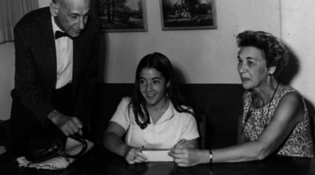 loading
loading
From the EditorThe year of womenMaking plans for the double anniversary of coeducation.  Manuscripts and ArchivesAmy Solomon ’73 becomes the first woman to register as an undergrad at Yale, 1969. View full imageI understand now that when I arrived as an undergraduate, in 1977, women students at Yale College were a startlingly new thing. Eight years earlier, there wasn’t a single undergraduate female Yalie in the world. But I was 17 in 1977, and to me eight years were an epoch. Coeducation seemed like a long-established norm. We belonged. I wasn’t the only one who felt that way. Eve Rice ’73, who entered Yale College in 1969—meaning she was one of the first undergraduate women—has heard the same thing from other early alumnae, including one who matriculated in 1974. It’s striking that the college became functionally coeducational so quickly (certain athletics facilities and Skull and Bones aside). Astute administrators played a critical role, especially Elga Wasserman ’76JD and Henry “Sam” Chauncey Jr. ’57, who were in charge of the strategy and logistics of coeducation. But the women of 1969, the pioneers, smoothed the way for the rest of us. “We had to navigate many spaces and traditions that had not formerly accommodated women,” remembers Rice, a doctor and a member of Yale’s Board of Trustees. “On a daily basis we were thrown into situations where there wasn’t necessarily a road map for women.” Sometimes the experiences were painful or unpleasant, like being stared at in the dining hall. Others were affirmative. Rice remembers “every morning sitting down at breakfast with mostly guys, and we’d sit and talk about the New York Times, and I felt like I belonged.” Fall 2019 will be a double anniversary for Yale women: the 50th for undergraduates and the 150th for School of Art students. Because the art school was the first Yale school to admit female students, fall 2019 is, in fact, a 150th anniversary for every alumna of the university. Rice and Linda Koch Lorimer ’77JD, a recently retired vice president of Yale, are planning a commemoration that will last an entire year. There will be a gathering of the first Yale undergrad women in fall 2019, a weekend for all alumnae in 2020, and in between, a year of celebration and exploration of Yale women’s experiences and achievements at and after Yale. The events will be university-wide; every Yale school will choose its own theme and projects. The Yale Symphony Orchestra has already decided to spend the year performing works by women composers. Lorimer believes the year will help to surface the work of Yale women in all kinds of fields, including service and community efforts that are often overlooked. One project that may start immediately—this May during reunions—is a plan to record memories and stories of the women of 1969. (There were women in three different classes that year, with transfer students in ’71 and ’72 and first-years in ’73.) Video sessions will take place in some major cities, and for those who can’t join, there may be cellphone interviews. These recordings are critical, Rice and Lorimer say, for preserving a record of the history of that time. More broadly, Rice adds: “Going through that year, there will be a lot to analyze, and think about, and celebrate. There’s a lot to be said for not only looking backwards but looking forward.”
The comment period has expired.
|
|